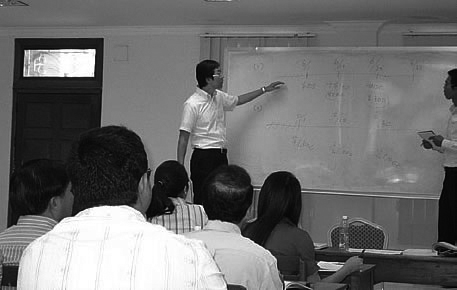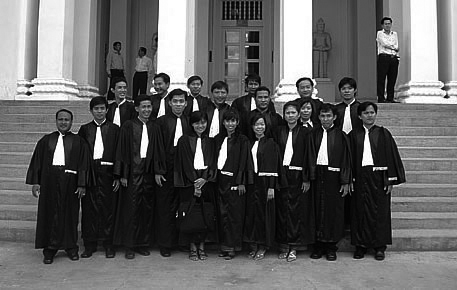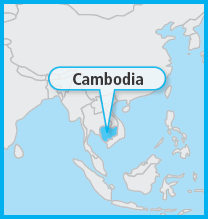Japan's Official Development Assistance White Paper 2009
Column 8 Aiming for a Stable Society
— Support for the Development of Legislation in Cambodia —
In recent years, Cambodia has seen rapid economic growth, and it has achieved steady development in spite of the global financial crisis. Cambodia's capital, Phnom Penh, is filled with cars and motorbikes, and is a bustling city. The country has had a murky past with the genocide under the Khmer Rouge (Pol Pot)and land mines, but the people have overcome it, filled with positive attitude toward development.
The Khmer Rouge administration in the 1970s advocated fundamental socialism, and the values that the country had enjoyed until that time were all negated. Many intellectuals were killed and state functions consequently came to a halt. This included the functions in the judicial field, and the laws themselves were abolished. Japan, in response to a request from Cambodia, has been supporting the development of Cambodia's legal and judicial system since 1999. This support includes the following three projects: the "Legal and Judicial Development Project" for Cambodia's Ministry of Justice, the "Project for Improvement of Training on Civil Matters" directed toward training institutions for judges and prosecutors, and the "Legal and Judicial Cooperation Project for the Bar Association" for the bar association. In Cambodia, the civil procedure code that Japan helped its drafting process was enacted in July 2006 and took effect in July of the following year. The civil code was enacted in December 2007. These have been put into place, but understanding level for legal matters and laws by administrative officials is still at a low level. Therefore, Japan is currently focusing its support on the dissemination of the laws.
Active prosecutor Mr. Ryota Tatemoto has been dispatched by Japan's Ministry of Justice as an expert to Royal school for judges and prosecutors, which provide education on Cambodia's future legal profession, and he provides close support. This project began four years ago in November 2005. At that time, it was common for experts to give lectures on the civil code and civil procedure code directly to students, but now lectures are given only to graduates who are expected to become instructors in the near future ("instructor candidates"). These candidates then give lectures to the students, and this is helping the schools to become more independent. Initially many of the schools were dependent on experts from Japan, but starting in 2008, they began proactively using instructor candidates, and in the first half of that year all of the courses were given by Cambodian instructors and instructor candidates. It is now common to see instructor candidates giving classes in place of the instructors who are extremely busy, and the candidates gain a deeper level of understanding in the course of preparing for the classes. Mr. Tatemoto comments, "The candidates are reliably growing and flourishing."
These schools provide education not only for rookies in the judiciary, but also for experienced judges continuosly. Mr. Tatemoto took note of one judge in particular who repeatedly participated in lectures that he was not signed up for. When Mr. Tatemoto asked him about this, he replied, "I missed part of the explanation during the question and answer session of the last lecture, so I came again today." Opportunities for active judges to attend lectures on the civil code and civil procedure code that Japan has helped with are limited, so it seems that the students are enthusiastic about making the most of them. Mr. Tatemoto says that, for such students, he would like to quickly complete teaching materials that are currently being made for this project.
Support for the judicial field will require close attention over a long period of time. Mr. Tatemoto intends to continue to assist Cambodia from the view point of judiciary.

Training for instructor candidates by Expert Tatemoto (Photo: JICA)

Graduation ceremony of the Royal School for Judges and Prosecutors (RSJP) (Photo: JICA)

